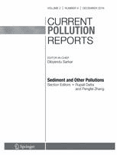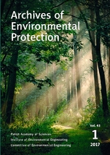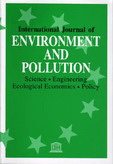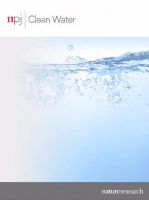
Current Pollution Reports
Scope & Guideline
Exploring the Frontiers of Pollution Science
Introduction
Aims and Scopes
- Environmental Pollution Assessment:
The journal covers the assessment of various pollutants, including air, water, and soil contaminants, and their implications for ecosystems and human health. - Pollution Mitigation Technologies:
Research on innovative technologies and methodologies for pollution control and remediation, including bioremediation, advanced oxidation processes, and waste management strategies. - Impact of Pollution on Biodiversity:
Studies examining the effects of pollution on various species and ecosystems, emphasizing the ecological consequences of anthropogenic activities. - Sustainable Practices and Policy Recommendations:
The journal promotes sustainable practices and provides policy insights aimed at reducing pollution and enhancing environmental protection. - Emerging Contaminants and Health Risks:
Focus on the investigation of new and emerging pollutants, such as microplastics and PFAS, and their potential health risks to humans and wildlife.
Trending and Emerging
- Microbial and Bio-Based Solutions:
There is a growing emphasis on utilizing microbial processes and bio-based technologies for pollution remediation and resource recovery, indicating a shift towards sustainable and eco-friendly practices. - Health Impact of Environmental Pollutants:
An increasing number of studies focus on the health effects of pollutants, particularly in relation to vulnerable populations, such as children and the elderly, underscoring the intersection of environmental and public health. - Advanced Analytical Techniques:
The adoption of advanced analytical methods for detecting and characterizing pollutants, including nanotechnology and novel biosensors, is on the rise, enhancing the ability to monitor environmental contaminants. - Impact of Climate Change on Pollution Dynamics:
Research exploring the interactions between climate change and pollution, particularly regarding how changing weather patterns influence pollutant behavior and distribution, is gaining prominence. - Circular Economy and Waste Valorization:
Emerging interest in circular economy principles, focusing on waste valorization and the sustainable use of resources, is reflected in recent publications that advocate for innovative approaches to waste management.
Declining or Waning
- Traditional Pollution Sources:
Research focusing solely on traditional pollution sources, such as industrial discharges, has decreased as attention shifts towards more complex and emerging contaminants. - Single-Pollutant Studies:
There is a waning interest in studies examining the effects of single pollutants in isolation, with a growing emphasis on multi-pollutant interactions and their cumulative impact. - Static Environmental Assessments:
The trend is moving away from static assessments of pollution toward dynamic modeling and real-time monitoring approaches that provide more comprehensive insights. - Generalized Health Impact Studies:
Studies that broadly address health impacts without specificity to particular pollutants or exposure pathways are becoming less common, as research increasingly focuses on detailed mechanistic insights. - Traditional Waste Management Techniques:
Research centered around conventional waste management methods is declining, as innovative and sustainable waste conversion technologies gain traction.
Similar Journals

Pollution
Advancing knowledge for a cleaner tomorrow.Pollution is a distinguished open-access journal published by UNIV TEHRAN, dedicated to advancing the understanding of environmental science and the multifaceted aspects of pollution research. Since its establishment in 2015, the journal has been committed to disseminating high-quality, peer-reviewed articles that address the pressing issues of environmental degradation globally. With an impact factor and a Scopus rank that places it within the top tier of Environmental Science (Rank #141/233), Pollution serves as an essential resource for researchers, professionals, and students alike. The journal encompasses a wide range of topics, including the sources, effects, and mitigation strategies related to various forms of pollution, thereby aiming to contribute significantly to the scientific community's efforts in promoting environmental sustainability. Its innovative and timely approach positions Pollution as a vital platform for sharing knowledge and fostering interdisciplinary collaboration in the environmental science domain.

Frontiers of Environmental Science & Engineering
Pioneering interdisciplinary research for environmental innovation.Frontiers of Environmental Science & Engineering is a premier journal published by HIGHER EDUCATION PRESS that stands at the forefront of interdisciplinary research in environmental science and engineering. Established in 2013 and converging its scope through 2024, this journal has swiftly ascended to a notable Q1 category in the Environmental Science (Miscellaneous) segment, highlighting its remarkable impact and relevance. With a Scopus ranking of 27 out of 233 in its field, placing it within the top 88th percentile, it serves as a crucial platform for disseminating cutting-edge research, innovative methodologies, and pressing environmental concerns. Researchers, professionals, and students alike will find valuable insights and opportunities for collaboration within its pages. While the journal operates under a subscription model, its commitment to advancing the field makes it an essential resource for those dedicated to addressing the world's environmental challenges, fostering sustainable practices, and pioneering engineering solutions.

Archives of Environmental Protection
Pioneering Environmental Science for Global ImpactArchives of Environmental Protection, published by the Polish Academy of Sciences, is a pivotal journal in the field of Environmental Science. With an ISSN of 2083-4772 and E-ISSN of 2083-4810, this journal serves as a critical platform for disseminating innovative research and comprehensive reviews that address the complexities surrounding environmental issues. As of 2023, it holds a respectable Q3 ranking in Environmental Science, reflecting its relevance and contribution to the academic community, indicated by a Scopus rank of 124 out of 233 in the General Environmental Science category. Although it operates without Open Access, the journal's consistent publication from 2007 to 2024 emphasizes its commitment to advancing knowledge in diverse areas of environmental protection. Researchers, professionals, and students are encouraged to engage deeply with the wealth of insights offered through the rigorous peer-reviewed articles presented in this journal, which strive to foster sustainable practices and environmental stewardship.

Rocznik Ochrona Srodowiska
Catalyzing Sustainable Practices through Rigorous ResearchRocznik Ochrona Srodowiska, published by the Middle Pomeranian Scientific Society for Environmental Protection, is an esteemed journal dedicated to advancing the field of environmental science in Poland and beyond. With an ISSN of 1506-218X, this peer-reviewed journal has established itself as a vital resource since its inception in 2007, addressing various environmental issues and promoting sustainable practices. Currently holding a Q3 category ranking in the Environmental Science (miscellaneous) field for 2023, it places itself in the 23rd percentile of Scopus rankings, reflecting a growing influence in the broader environmental research community. While the journal is not open access, it serves as an important conduit for researchers, professionals, and students to disseminate their findings and contribute to the interdisciplinary dialogue aimed at tackling pressing environmental challenges. With a commitment to rigorous research and practical applications, Rocznik Ochrona Srodowiska remains an essential platform for fostering innovation and collaboration in environmental studies.

Advances in Environmental Research-An International Journal
Driving Change through Scholarly DiscourseAdvances in Environmental Research is an international journal published by TECHNO-PRESS, dedicated to advancing our understanding of environmental science and sustainability. Operating with an ISSN of 2234-1722 and an E-ISSN of 2234-1730, this journal serves as a premier outlet for researchers, professionals, and students aiming to share pioneering research findings, case studies, and reviews that address contemporary environmental challenges. The journal aims to provide a platform for scholarly discussion on a wide range of topics, including pollution control, resource management, and ecological conservation. Though currently classified as a non-open access journal, it remains accessible through various institutional subscriptions, allowing a broad audience to engage with its content. Committed to fostering academic collaboration and innovation, Advances in Environmental Research plays a crucial role in informing policymakers and the scientific community about emerging trends and solutions in environmental studies, making it an essential resource for those dedicated to creating a sustainable future.

ENVIRONMENTAL ENGINEERING SCIENCE
Exploring innovations in environmental science and engineering.ENVIRONMENTAL ENGINEERING SCIENCE is a leading journal published by MARY ANN LIEBERT, INC that provides a platform for pioneering research in the fields of environmental chemistry, pollution control, and waste management. With an ISSN of 1092-8758 and an E-ISSN of 1557-9018, this peer-reviewed journal aims to disseminate high-quality scientific studies that address critical environmental challenges. As evidenced by its 2023 category quartile rankings, it holds a notable position at Q3 in Environmental Chemistry and Pollution and Q2 in Waste Management and Disposal, highlighting its relevance and impact in these domains. Spanning over two decades from 1997 to 2024, the journal is dedicated to fostering innovations and promoting rigorous scholarship that can contribute significantly to sustainable environmental practices globally. Authors and researchers are encouraged to engage with this essential resource, which offers Open Access options to enhance the visibility and reach of their work. For those interested in advancing their understanding and practice within the environmental sciences, ENVIRONMENTAL ENGINEERING SCIENCE is an indispensable journal to consider.

Environmental Chemistry Letters
Connecting global researchers for a greener tomorrow.Environmental Chemistry Letters, published by Springer Heidelberg, stands at the forefront of interdisciplinary research within the field of Environmental Chemistry. Since its inception in 2003, this esteemed journal has provided a dynamic platform for the dissemination of innovative studies and groundbreaking findings, contributing significantly to the understanding of chemical processes affecting the environment. With an impressive impact factor and ranking third out of 147 journals in Environmental Chemistry (98th percentile as per Scopus), it consistently attracts high-quality submissions from researchers around the globe. The journal maintains a Q1 category rank as of 2023, underscoring its prominent position in scholarly discourse. Environmental Chemistry Letters is dedicated to advancing knowledge on contemporary environmental issues, fostering solutions to mitigate chemical pollution, and promoting sustainable practices across various sectors. Researchers, professionals, and students alike will find invaluable resources within its pages as it continues to illuminate the path toward environmental sustainability.

Environmental Engineering Research
Championing research that protects our planet.Environmental Engineering Research, published by the Korean Society of Environmental Engineers (KSEE), stands as a pivotal journal in the field of environmental engineering. With an ISSN of 1226-1025 and an E-ISSN of 2005-968X, this esteemed journal has shown remarkable growth since its inception, converging years from 2011 to 2024. The journal is recognized in the Scopus ranking system, holding a position of #46 out of 197 in the Environmental Science category, marking it in the 76th percentile—a testament to its impact and significance in the field. Furthermore, it enjoys a commendable Q2 ranking in Environmental Engineering for 2023. While the journal operates under a traditional access model, its commitment to disseminating vital research and innovative solutions for environmental challenges enhances its appeal to researchers, professionals, and students alike. The Environmental Engineering Research journal invites contributions that advance the understanding and application of engineering principles to environmental issues, providing a forum for scholars dedicated to fostering sustainability and environmental protection.

INTERNATIONAL JOURNAL OF ENVIRONMENT AND POLLUTION
Empowering Researchers to Tackle Global Environmental ConcernsInternational Journal of Environment and Pollution is a pivotal publication in the field of environmental science, dedicated to advancing knowledge concerning pollution and its multifaceted impacts on ecosystems and human health. Published by InderScience Enterprises Ltd, this journal, which has been in circulation since 1991, serves as a vital platform for researchers, professionals, and students interested in the management, monitoring, policy, and law associated with environmental issues. With an ISSN of 0957-4352 and E-ISSN 1741-5101, it offers a critical perspective on pollution challenges, emphasizing Waste Management and Disposal. Although placed in the Q4 quartile of its categories, it remains an important resource for understanding the complexities of environmental impact, contributing to policy formulation and ecological research. The journal does not offer Open Access, but it can be accessed through various academic libraries and institutions that value comprehensive studies in environmental management. Engage with the latest findings and discussions that address pressing environmental concerns today!

npj Clean Water
Championing global collaboration for water quality.npj Clean Water, published by NATURE PORTFOLIO, is a premier open-access journal dedicated to advancing the field of water science and technology. Since its launch in 2018, this innovative publication has quickly established itself as a leading platform for original research and policy discussions concerning clean water access and quality. With an impressive impact factor and categorized in the Q1 Quartile across multiple environmental science disciplines—including management, monitoring, pollution, and waste management—npj Clean Water stands out for its rigorous peer-review process and commitment to disseminating high-quality research. Researchers, professionals, and students involved in water-related challenges will find invaluable insights that address critical environmental issues and promote sustainable practices. Access to articles is freely available, encouraging global collaboration and knowledge sharing within the water sector. This journal embodies a significant step towards achieving innovation and policy advancements in the pursuit of a cleaner, safer water future.